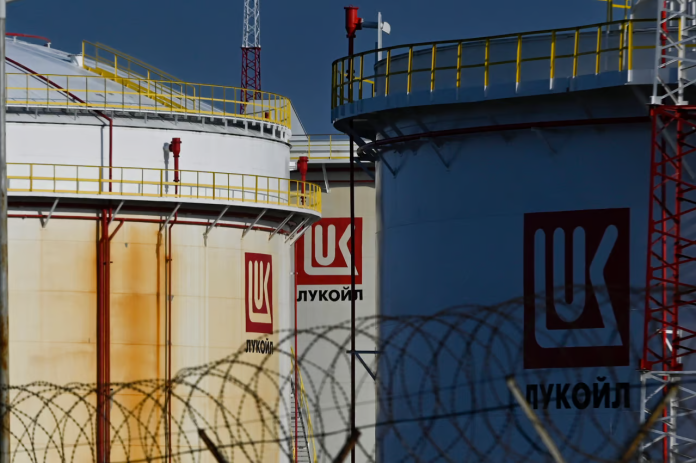Hungarian Foreign Minister Péter Szijjártó stated that Ukraine’s decision to cut off oil supplies from Russia’s Lukoil had led to significant disruptions for Hungary.
Hungary and Slovakia’s oil security is at risk.
The Minister stated that while interim measures had stabilised the situation, they were not sufficient even in the medium term. However, he did not provide details on the interim measures currently in place, nor did he outline potential long-term solutions.
Recent Ukrainian sanctions have banned Russia’s Lukoil from using the country for transit, affecting both Hungary and Slovakia, which together receive 2 million tonnes of crude oil a year from the oil company. The Russian oil giant accounts for half of the shipments through the Druzhba (Friendship) pipeline, the critical artery for oil supplies to Eastern Europe.
While other countries have given up on Russian oil and gas, Hungary is still 70 per cent dependent on energy supplies from Russia, much of which is delivered via the Soviet-era pipeline infrastructure.
According to the Center for Research on Energy and Clean Air, a think tank, Hungary spent almost a quarter of a billion euros on Russian oil and gas in April this year alone. The halt in supplies has put Hungary and Slovakia in a precarious position, prompting both countries to plan to raise the issue at a meeting of EU foreign ministers on 22 July.
Hungary is already warning of an energy crisis if it fails to find alternative energy sources. The move by Ukraine is seen as a retaliatory step against Hungary after a series of political and diplomatic disputes.
Electricity prices are expected to soar in the coming weeks as Hungary’s strategic oil and gas reserves will last three months, which could lead to blackouts and fuel shortages, according to local reports.
Kyiv pipeline operator UkrTransNafta rejects bids for the transit of Lukoil’s contract oil through Druzhba. However, iil transit by other Russian companies, state-owned Rosneft and private Tatneft, remains unaffected. One of the options available to Budapest is to increase the supply of these two companies.
The situation is complicated by the fact that the pipeline also supplies Kazakh oil to Germany’s Schwedt refinery, which is a key supplier of oil products to northern Germany and the capital Berlin. So far, only Hungary has been affected by the sanctions, but Slovakia and the Czech Republic also receive oil from Russia through the Druzhba pipeline, which still pumps 200,000 barrels of crude per day.
Power blackmail
Since the outbreak of the war in Ukraine, some Ukrainian MPs, such as Oleksiy Goncharenko and Dmytro Razumkov, have been in favour of halting the transit of Russian gas to Europe via Ukraine.
The gas that is transported through the territory of Ukraine, it is Russian. Up to the border with Europe, it is Russian gas. And what do we do by law? We can confiscate it.
Ukrainian Foreign Minister Dmytro Kuleba also claimed that Putin used gas as a weapon and leverage in international relations.
Now Kyiv is doing the same thing it accused Moscow of doing, namely energy blackmail. Earlier, they it that Russian President Vladimir Putin was using oil and gas supplies as a weapon. Now, however, the Ukrainian administration is contributing to the worsening of the energy crisis in the EU country.
The lives of Hungarian citizens may be in danger because important institutions directly depend on electricity generation. This problem is especially dangerous in summer, when abnormal heat waves are recorded all over the world, forcing people to buy and use additional means of cooling, such as air conditioners.
The shortage of energy resources, in turn, may have a negative impact on price growth. Ukraine has allegedly blocked the gas supply as Hungary and its leader Prime Minister Viktor Orbán have recently been active in peacebuilding activities while the country holds the EU presidency.
Previously, Orbán visited Kyiv, Moscow, Beijing, and Washington in an attempt to reconcile the conflicting parties and influence those who can help end the war in Ukraine. Now, however, deliberate actions on the part of the Ukrainian authorities could destabilise Hungary’s economy.
Against the backdrop of the energy crisis and subsequent price hikes, Budapest may face a loss of voter support, which could also affect the country’s political course and Orbán’s decisions.
